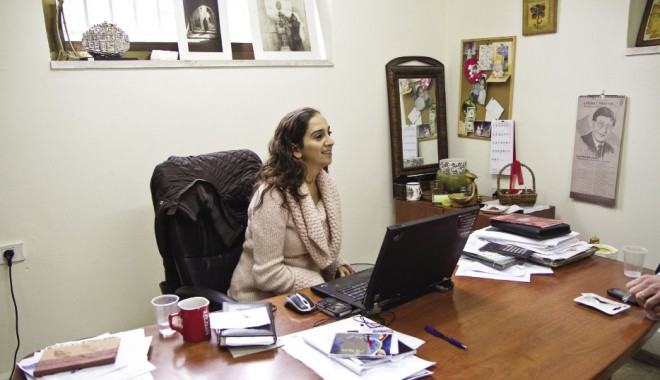
On the day a reporter and photographer for Peacebuilder visited Maysa Baransi (SPI ’09) in her East Jerusalem office, the All for Peace radio website was down, the work of hackers hostile to the station’s mission. Since co-founding All for Peace, the first joint Israeli-Palestinian radio station, Baransi has gotten used to this kind of thing.
To promote peace and mutual understanding, the station exposes listeners to a wide variety of perspectives and opinions – which means it has supporters, and more worrisomely, detractors on both sides of the conflict.
“We have lots of negative feedback but when [that happens], we know that we’re getting to the right target group. We’re here to convert the unconverted, not the converted,” says Baransi, 36, now the station’s executive director.
Having previously worked for the first private Palestinian radio station, Baransi knew that both Israelis and Palestinians are big consumers of media. Inspired by radio’s potential to reach an enormous audience in the region, she and an Israeli partner, Mossi Raz, co-founded All for Peace in 2004.
From its studios in East Jerusalem and Tel Aviv, a small staff and numerous volunteers produce around 50 programs on political, cultural and religious topics. The station’s hosts likewise report and comment on issues from divergent points of view. The official purpose of the station is to provide a platform for alternative voices and to promote coexistence, peace, mutual respect, pluralism and social justice. The effort has stretched both the station’s audience and its staff.
“It was very challenging for the other to see the other, not only as Israelis and Palestinians, but for the seculars to see a religious person coming in here and talking about their own beliefs,” says Baransi, who was raised as a Christian in a Greek Orthodox family from Galilee. (A 2007 article in the Israeli newspaper Haaretz quoted Baransi telling her daughter, “There was the first prophet, Moses, and people didn’t listen to him and then God took the second prophet, Jesus, and he wasn’t listened to either, and then God took the third prophet, Mohammed, and people don’t listen to him. But God is the same God.”)
All for Peace’s mixture of programming intentionally pushes listeners out of their comfort zones. The audience attracted by one particular show inevitably will be exposed to very different points of view expressed on programs aired just before and after. All for Peace produces programming in Arabic, Hebrew, Russian and English, and began broadcasting in two frequencies – one Hebrew and one Arabic – in 2010. For their work, Baransi and Raz received the Outstanding Contribution to Peace award in 2010 from the International Council for Press and Broadcasting. Earlier it received a United Nations Award for Intercultural Innovation.
Angry phone calls and hacker disruption of the radio station’s website, however, amount to sideshows beside official crackdowns. In November 2011, the Israeli Communications Ministry issued a shut-down order. Claiming that All for Peace was broadcasting illegally into Israel (its transmitter is in the West Bank), the ministry initially justified the decision on the basis that the station’s Hebrew advertising caused economic harm to legal Israeli stations. A conservative Israeli politician later said All for Peace was shut down for “incitement.”
Denying the charge of illegal operation, All for Peace appealed the ministry’s decision to the Israeli Supreme Court, which had not ruled on the case as of early September 2012. In the meantime, the station’s Hebrew frequency has been taken off the air, reducing its advertising revenue by 90 percent, according to other news reports (though, with grant and foundation money, the station is not wholly dependent on advertising sales). The station continues to broadcast online, as well as through its Arabic-language frequency in the West Bank.
For the moment, Baransi and All for Peace Radio remain caught in a limbo, awaiting the court ruling on the station’s future. In a way, it serves as an allegory, Baransi says, of the frustrating, up-and-down, one-step-forward, two-steps-back nature of the entire peace process.
“Sometimes you feel very encouraged,” she says. “And sometimes you look back and say, ‘My God, I’m just going backwards.’” — AKJ
Postscript: As Peacebuilder was being readied for publication, we learned that a rubber bullet shot from an Israeli checkpoint shattered Baransi’s rear car window on Aug. 10, 2012, as she drove with her daughter between Ramallah and their home in East Jerusalem. In seeking to understand the reason for the shooting, Baransi was told that a riot had recently occurred in that area and that Israeli officials were still in a response mode to that event.